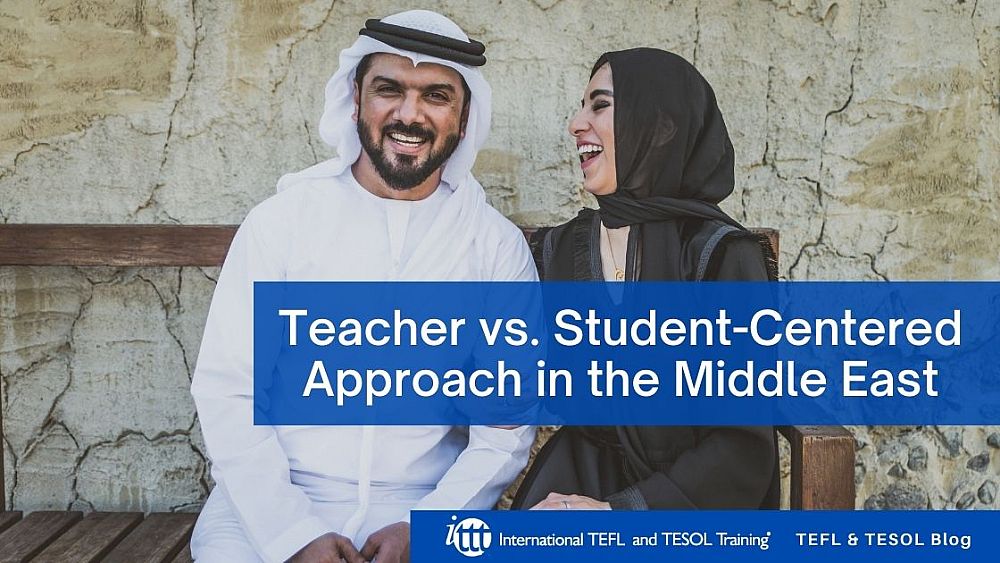Teacher vs. Student-Centered Approach in the Middle East

Teachers in the Middle East are used to the traditional method of teaching, the teacher-centered approach, because this way is easier to manage the class, and it is what they are used to. However, over the last few years, there has been a greater shift towards the student-centered approach, which is still new for both teachers and students.
Table of Contents
Amazing Development of Students
Are you ready to teach English abroad or online?
Check out what our course grads say in our many video testimonials!
The traditional way of learning starts with memorization, the lower level of Bloom's taxonomy, and focuses on "learning to pass" rather than being able to independently use the knowledge in the long term. Thus, the teacher is the focal point of the class, and the student's role is secondary. The teacher will prepare the lesson based on content to cover and not necessarily on the individual learning outcomes. This may be done in the form of lecturing or the teacher talking throughout the whole class whilst the students are sitting passively. The other word for this is 'spoon-feeding' and does not help life-long skills or the students to be independent thinkers. Thus, students are not encouraged to think and are often told what and how to think critically. As a result, they are bored and lose interest in the class.
The student-centered approach is where the focus is shifted from the teacher to the student. The teacher; facilitates, guides, and does not take up the class with teacher-talk time. The student is at the forefront and is at the center of making decisions, activities, assessments, which gives them greater responsibility and personalizes learning. This is a shift from starting with the lower level of Bloom's taxonomy to the higher level.
It is evident that this is still a new concept in the Middle East with which educators are struggling as they are often caught in fear of change or doing what everyone else is doing in class, 'the so-called norms,' and not being prepared to take the risk of trying something new with students for fear of being different to peers or fear of students reaction, consequently leading to an unwillingness to put students at the focal point of their own learning journey.
Paving the Way
The educators in the Middle East perhaps do not cope well with the change towards the student-centered approach and are still experimenting and finding their way in this regard because of factors such as the lack of CPD, the fear of changes and empathizing with the students, so they set limitations which become unhealthy and non-productive. Whilst it is a fact that in the Middle East, students are taught from secondary school about just "wanting to pass', there is no reason this notion cannot be changed.
Over the last ten years in the Middle East, perhaps due to technology, the students have become more advanced, and each year, the students crave to be better equipped and prepared for higher education. They enjoy the student-centered approach methods of teaching and are motivated in their learning journey.
It is important for educators in the Middle East to step up and implement different methods and show the students that the student-centered approach is beneficial in the long term and makes them better students as they become active rather than passive.
"Most faculty have been well prepared in the disciplines they teach, but too few have been prepared for the reality of today's students- the ways they learn, and the cognitive and affective challenges they bring with them through the open door" Quote by John Roush.
Amazing Development of Students
It is evident that the shift to the student-centered approach has had an invaluable effect on the attitude of students because of self-achievement. They no longer see learning as a routine or that they are forced to do if they are active and motivated to learn.
Also, students come to the realization that they have skills such as independent thinking, analyzing, teamwork, and the ability to think beyond just 'passing.' The focus shifts from just 'passing' to actually wanting to learn and show the knowledge gained. The end result is that when students are challenged and given responsibility, they are able to deliver amazing results, which they did not believe that they could do or have in them. Overall, the level of confidence boosts has a lasting positive impact.
I wish and hope to see that all students in the Middle East are given this opportunity. I remain hopeful and have put over 100% effort into this type of teaching and student learning. It has been an extremely rewarding experience that will never be forgotten.
Are you ready to teach English abroad or online?
Apply now & get certified to teach english abroad!
Speak with an ITTT advisor today to put together your personal plan for teaching English abroad!
Send us an email or call us toll-free at 1-800-490-0531 to speak with an ITTT advisor today.
Related Articles:
- Top 10 Cities in Europe with the Highest Demand for English Language Teachers
- 5 Reasons To Take A TEFL Course Right Now - Even If You Are Not Leaving Yet | ITTT | TEFL Blog
- All the Documents You Will Need to Teach English Abroad
- The Impact of Positive Motivation on an ESL Classroom
- You're Never Too Old to Change Your Life and Do a TEFL Course | ITTT | TEFL Blog
- Getting Student Placement Right - The Best Desk Arrangements for EFL Students



